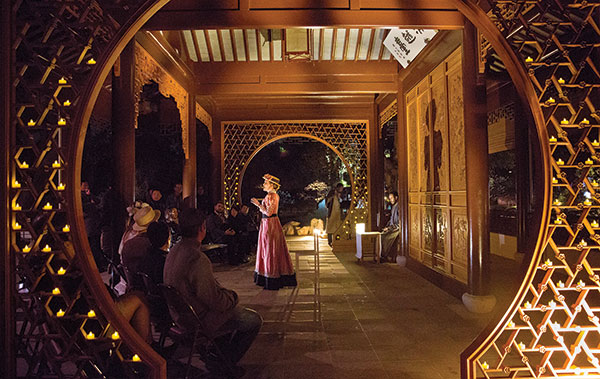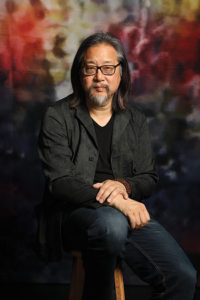By Jana Monji
AsAmNews Contributor
The night is much darker here than the surrounding streets. To walk, we follow a lantern and listen for a bell. Entering the area known as the Garden of Flowing Fragrance we learn about love, the Chinese in America and the Peony Pavilion. This is the last week of performances of Stan Lai’s Nightwalk in the Chinese Garden.
Nightwalk in the Chinese Garden is a site-specific play limited to 40 people each night at the Chinese garden in the Huntington Library. The Chinese garden wasn’t there when railroad and estate businessman Henry and his wife Arabella Huntington were alive. Henry died in 1927; Arabella, 1924. The garden originally opened in 2008. The tickets for the play sold out almost at once. The group first meets in the garden’s teahouse and then split into two groups.
“On east side,” Lai explained, “We’re dealing with themes from Peony Pavilion.’” which is about a young Chinese woman who falls asleep in a garden and dreams of a young scholar. She wastes away and dies of heartbreak. The scholar comes to the garden and also dreams of the girl. Through the power of love and supernatural doings, she is resurrected and the two get their happy ending. “On the west side, we’re dealing with a story from the 1920s about California” about a male artist named Willow who has been commissioned by Henry E. Huntington to produce a painting that would be the perfect match for The Blue Boy, a masterpiece by Thomas Gainsborough (1727-1788) that Huntington had recently purchased. The cast includes professionals, CalArts students and alumni and Chinese opera performers from the Shanghai Kungu Troupe.

Each scene ends with the sound of a bell and the group then follows an attendant with a lantern. Both groups meet to see a brief Chinese opera performance before continuing on to see the other part of the story in reverse order and finally reunited at the teahouse.
Art aficionados will know that a match was found for Blue Boy, but not from Willow, the artist commissioned to create a painting to pair with Blue Boy. Instead Blue Boy was paired with Sarah Barrett Moulton: Pinkie, painted in 1794 by Thomas Lawrence (1769-1830).
What is the play about? According to Lai, “What it means to collect art. What it means to be an artist. What it means to be Chinese. What it means to be Chinese in America.”

Born in Washington, DC as Lai Shung-chuan (賴聲川) in 1954, the Taiwanese Lai is best known for his Chinese language plays. Lai received his Ph.D. from UC Berkeley in 1983 and was a professor and founding dean of the College of Theatre at the National University of the Arts in Taiwan. He and his wife Ding Nai-chu (丁乃竺) also founded a contemporary theater group: Performance Workshop (表演工作坊).
The play itself lightly touches on the Chinese Exclusion Act and the romance of falling in love with a picture–as a man and as an art collector. Lai hopes that the success of the play will open up more opportunities at the Huntington. It opens up a new phase in his life.
Nightwalk in the Chinese Garden is his first English play. The 63-year-old Lai explained, “At this time in my career which is seemingly later because it’s been going on for over 30 years and all in the Chinese language I really feel it’s time to do more work in English and to serve as a bridge because I am bilingual, bicultural.”
Shivering on a real stone bridge in the Garden of Flowing Fragrance, one could feel an emotional bridge between East and West forming. What a difference a century makes.
AsAmNews has Asian America in its heart. We’re an all-volunteer effort of dedicated staff and interns. Check out our Twitter feed and Facebook page for more content. Please consider interning, joining our staff or submitting a story.



